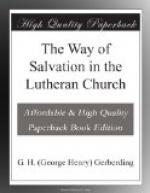Our Church, in this particular also, is purely scriptural. Israel of old had seasons of special preparation, previous to special manifestations from God. There was a season of special preparation before the giving of the Law; also before the receiving of the quails and the manna from heaven. There were days of preparation before and in connection with the great annual festivals, as well as in connection with other great national and religious events. Our Lord, Himself, observed a most solemn preparatory service with His disciples before He instituted the Last Supper. He not only spoke very comforting words to them, but He also plainly pointed out to them their sins, e.g., their pride, their jealousy, their quarrels, their coming defection, the fall of Peter and the treachery of Judas. In harmony with all this, Paul directs: "But let a man examine himself, and so let him eat of that bread and drink of that cup."
And it is to aid and assist the communicant in this self-examination that we have our preparatory service. Its great object is to enable the communicant to realize his own sinfulness, to deepen in him true penitence and longing for forgiveness, and also to aid him in appropriating and rejoicing in the full and free forgiveness of Christ. To this end we sing our penitential hymns, plead for Grace to know ourselves, our sinfulness, and the fulness of Christ’s Grace, and hear such searching appeals from the pastor as often pain and agonize the heart.
Then follows, on the part of the whole congregation, a united, audible and public confession of sin, of sorrow because of it, of earnest desire for forgiveness, of faith in Christ as the divine Saviour, and of an earnest purpose to hate and avoid all sin in the future. After this public confession in the presence of the pastor and of one another, the same confession is repeated, on bended knees, directly to God. This two-fold confession—first in the presence of the pastor and of one another, and then directly to God—is followed by the words of absolution from the pastor.
In pronouncing the absolution the minister uses the following, or words to the same effect: “Almighty God, our heavenly Father, having of His great mercy promised the forgiveness of sins to all those who with hearty repentance and true faith turn unto Him, and having authorized His ministers to declare the same, I pronounce, to all who do truly repent and believe on the Lord Jesus Christ, and are sincerely determined to amend their ways and lead a godly and pious life, the entire forgiveness of all your sins, in the name of the Father, and of the Son, and of the Holy Ghost. Amen.”
Then follow a few words in which he assures the impenitent and hypocritical that their sins are not forgiven, but will certainly bring upon them the fearful wrath of Almighty God, unless they speedily repent, turn from their sins, and fly to the Lord Jesus Christ for refuge and salvation. This is the closing part of the preparatory service, which is called Confession and Absolution.




